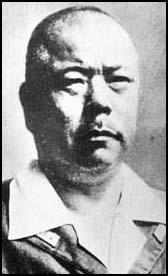Tomoyuki Yamashita

Tomoyuki Yamashita, the son of a village doctor, was born in Japan on 8th November, 1888. He enrolled as a military cadet and graduated at the Hiroshima Military Academy in 1906. He served in the Japanese Army as a second lieutenant before attending the Japanese War College in 1916.
Yamashita joined the general staff and was sent as a military attaché in Germany (1919-1922). He returned to lecture at the Japanese War College before serving as in Austria and Hungary. In August 1931, Yamashita became head of the Army Affairs Section of the Military Affairs Bureau.
In February 1936, Yamashita played a minor role in the military coup against the government. As was not punished but was sent to Korea as commander of the 40th Infantry Brigade. The following year he was promoted to lieutenant general and took over the China Garrison Brigade before becoming chief of staff of the Northern China Area Army in September 1939 and fought in Manchuria.
When Hideki Tojo became Minister of War he sent Yamashita to Europe where he spent time with the German Army. On his return Yamashita reported that Japan needed more air power, medium tanks and parachute units. He also advised against going to war against the United States or the Soviet Union until the Japanese armed forces were modernized.
In July 1941 Yamashita was placed in command of the Kwantung Defense Army. He led the invasion of Malaya and Singapore and on the 15th February, 1942 accepted the surrender of General Arthur Percival and 100,000 soldiers of the British Army.
Yamashita was promoted to general in February 1943 and sent to command the Japanese ground forces in the Philippines. By this time Japan was clearly losing the Pacific War and Yamashita told his chief of staff that it was his turn die. When he arrived he moved his headquarters to Manila but when the US Army under General Douglas MacArthur began landing on Mindoro, 150 miles south of Manila, he decided to concentrate on the defence of Luzon.
After the Allied landings in Luzon he freed the 4,000 prisoner of war and retreated to Baguio. In April he moved 50 miles farther inland at Bangbang. He was organizing the formation of guerrilla units when it was announced that Japan had surrendered.
Yamashita was captured on 2nd September 1945. Charged with violating the "laws of war". Although the Japanese Army had committed terrible atrocities in the Philippines there was no evidence that they acted under Yamashita's orders. However, Tomoyuki Yamashita was found guilty and hanged on 23rd February 1946.
Primary Sources
(1) General Douglas MacArthur wrote a report for Harry S. Truman where he advocated that Tomoyuki Yamahita should be tried as a war criminal.
It is not easy for me to pass penal judgment upon a defeated adversary in a major military campaign. I have reviewed the proceedings in vain search for some mitigating circumstances on his behalf. I can find none. Rarely has so cruel and wanton a record been spread to public gaze. Revolting as this may be in itself, it pales before the sinister and far reaching implication thereby attached to the profession of arms. The soldier, be he friend or foe, is charged with the protection of the weak and unarmed. It is the very essence and reason for his being.
When he violates this sacred trust, he not only profanes his entire cult but threatens the very fabric of international society. The traditions of fighting men are long and honorable. They are based upon the noblest of human traits-sacrifice. This officer, of proven field merit, entrusted with high command involving authority adequate to responsibility, has failed this irrevocable standard; has failed his duty to his troops, to his country, to his enemy, to mankind; has failed utterly his soldier faith. The transgressions resulting therefrom as revealed by the trial are a blot upon the military profession, a stain upon civilization and constitute a memory of shame and dishonor that can never be forgotten. Peculiarly callous and purposeless was the sack of the ancient city of Manila, with its Christian population and its countless historic shrines and monuments of culture and civilization, which with campaign conditions reversed had previously been spared.
It is appropriate here to recall that the accused was fully forewarned as to the personal consequences of such atrocities. On October 24-four days following the landing of our forces on Leyte - it was publicly proclaimed that I would "hold the Japanese Military authorities in the Philippines immediately liable for any harm which may result from failure to accord prisoners of war, civilian internees or civilian non combatants the proper treatment and the protection to which they of right are entitled."
